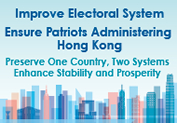Hong Kong - Where the World Looks Ahead
Hong Kong at a Glance
Hong Kong is a vibrant city, and a major gateway to Mainland China. This page will give you the facts about Hong Kong - from the form of government to the languages used.
Government
On 1 July 1997, Hong Kong became a Special Administrative Region of the People's Republic of China and the Basic Law came into effect. The Basic Law is the constitutional document of the Hong Kong Special Administrative Region (HKSAR). It enshrines within a legal document the important concepts of "one country, two systems", "Hong Kong people administering Hong Kong" and a high degree of autonomy. According to the Basic Law, the HKSAR enjoys executive, legislative and independent judicial power, including that of final adjudication, and its political system and way of life remains unchanged for 50 years.
- Head of Government: Chief Executive
- Cabinet: Executive Council
- Legislature: Legislative Council (90 seats)
- Highest Court: Court of Final Appeal
Hong Kong's Government structure
Basic Law
Legal System
The legal system of the Hong Kong Special Administrative Region (HKSAR) is based on the principles of the rule of law and the independence of the judiciary. The constitutional framework for the legal system is provided by the Basic Law enacted by the National People’s Congress of the People’s Republic of China (PRC) in accordance with Article 31 of the Constitution of the PRC. Under the principle of ‘one country, two systems’, the HKSAR legal system, which is different from that of Mainland China, is based on the common law, supplemented by statutes. All legislation in force in the HKSAR is accessible on the Hong Kong e-Legislation website.
Economy
Hong Kong's economy is characterised by free trade, low taxation and minimum government intervention. It is the world's 10th largest trading economy, with the mainland of China as its most significant trading partner. Hong Kong is also a major service economy, with particularly strong links to mainland China and the rest of the Asia-Pacific region.
Population
Hong Kong's population was approximately 7.50 million in the end of 2023. People of Chinese descent comprise the vast majority of the population.
More on Hong Kong's population
Language
Chinese and English are the official languages of Hong Kong. English is widely used in the Government and by the legal, professional and business sectors. Trilingual professionals who speak English, Cantonese and Putonghua play a vital role in the numerous enterprises trading in Hong Kong or doing business with mainland China and Taiwan.
More on Hong Kong's official languages
Geography
At the south-eastern tip of China, Hong Kong covers Hong Kong Island, Lantau Island, the Kowloon Peninsula and the New Territories, including 261 outlying islands. Between Hong Kong Island and the Kowloon Peninsula lies Victoria Harbour, one of the world's most renowned deep-water harbours.
Climate
Hong Kong has a subtropical climate. January and February are cloudier with cold spells, while March and April are milder and humid with fog. From May to August, it is hot and humid with occasional heavy rain and thunderstorms. Tropical cyclones usually occur between June and October, bringing high winds, heavy rain and sometimes storm surges. November and December are generally fine and dry with pleasantly cool weather, and may on occasion be relatively cold at night and in the early morning.
Public Holidays
Hong Kong provides two types of public holidays: statutory and general holidays. Statutory holidays are mandated under the Employment Ordinance and must be provided to all employees. General holiday under General Holidays Ordinance means a day which banks, educational establishments, public offices and Government departments shall keep as a holiday.
More information on statutory holidays
List of general holidays






















































